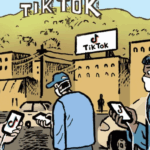Here’s today’s AdExchanger.com news round-up… Want it by email? Sign up here.
What’s For Sale?
Amazon has started down the path of “Googlification.”
Which is to say, its search engine has flipped from primarily serving up the best organic options to servicing advertisers with the best prospecting and conquesting opportunities.
There were turf wars in the early days of Amazon’s ad business, Jason Del Rey reports at Vox. At the time, unofficial ad placements were lucrative direct selling points for vendor account teams, and the core retail business begrudged ads as a drag on the customer experience.
Nowadays, sponsored products often take up every inch of above-the-fold listings, meaning people must scroll and load new items in order to see organic results.
Amazon also skirts the edge of acceptability when it comes to sponsored listings. Amazon uses a small, light-colored “sponsored” label just below larger, bolder labels such as “Highly Rated.” The “Highly Rated” sponsored placements replaced the organic “Top Results” carousel.
Sometimes Amazon even buries an indistinct gray “Sponsored” label at the bottom-right corner of a large ad unit or carousel.
These are all red flags for the FTC when it scrutinizes search engines. (Dark patterns, anyone?) But Amazon operates in an indistinct gray zone of its own because the FTC hasn’t issued guidance on retailer search ads, at least not yet, according to Vox.
Can TikTok Walk The Walk?
The youngs love TikTok. But is it really the next main mode of media and entertainment?
During a session at the IAB’s advanced TV summit in New York City this week, TikTok execs presented a chart mapping the evolution of media from silent movies (fast forward) to YouTube to … TikTok.
But TikTok considers itself to be in a class of its own. (It’s an entertainment platform, not a social media platform, thank you very much.)
According to TikTok’s director of product management, Masoud Loghmani, creator-generated video doesn’t require days of editing and thousands of dollars spent on production equipment as do campaigns for TV networks. Some YouTubers also spend big to produce their content.
But the barrier to content creation is lower on TikTok than other platforms, Loghmani said, and that helps spur engagement.
To help boost engagement even more, TikTok recently rolled out TikTok Pulse, which serves ads alongside viral videos on a user’s feed and shares revenue with the creator.
It’s easier said than done, however, for creators to make a living on the platform. TikTok creators say they’ve made just pennies and dollars on Pulse in its first year.
There may be a reason for that. Loghmani says the point of TikTok Pulse is to forecast content engagement and “nab the [best] opportunity to show an ad.”
Guess that means the program’s biggest beneficiaries are brands, not creators.
Change The Topic
Criteo is always game to roll up its sleeves and test the APIs in Google’s Privacy Sandbox.
On Thursday, Criteo published its initial review of the Topics API, Google’s interest-based targeting alternative to third-party cookies.
Criteo began testing in June when Chrome opened 1% of its stable base to the Privacy Sandbox. But it hasn’t been easy to reach scale.
“We are now observing close to 1 million daily Topic-tagged users and can offer our first assessment of the value of this signal,” writes Elias Selman, Criteo’s senior product data scientist.
The verdict? Topics needs work.
For one, topics such as “News,” “Sports” or “Cooking” are assigned by domain. BuzzFeed, for example, would probably get a topic tag like “News” (duh). But BuzzFeed content spans a huge gamut of more specific topics.
Criteo is pushing for topics to be assigned by URL or contextually tied to content on the page.
The other issue is that topics are mixed weekly and users could end up sitting in one topic segment for three weeks. That means topics aren’t useful for targeting against timely purchase intent.
CafeMedia has also argued that the Topics API doesn’t greatly benefit niche sites, which generate a lot of value (“woodworking” or “camera expert” is pretty darned specific), whereas major publishers like Vox (“News”) reciprocate relatively little value.
But Wait, There’s More!
Tech’s talent wars have come back to bite it in the you know what. [NYT]
TikTok wants to be a marketplace. [Marketing Brew]
The IAB Tech Lab begins a multiyear road-map process seeking advanced TV measurement standards for attribution, reconciliation and addressability. [release]
Axel Springer CEO Mathias Döpfner wants to be a press baron for the digital age. [New York Mag]
How many people are watching “Thursday Night Football”? That is up for debate. [WSJ]
You’re Hired!
Warner Bros. Discovery promotes Marybeth Strobel to EVP of ad sales. [The Wrap]
Virgin Galactic hires Jayanta Jenkins as its first head of brand and marketing. [Ad Age]
Merkle Media brings on Michael Butler as head of agency sales. [release]
Retail marketing company Bluecore adds Pat Deskin as CRO. [release]
IAS appoints Tania Secor as CFO. [release]












